Tabletop gaming has been around for a very long time. While I don’t want to dive into the rather lengthy history of gaming, every now and then it’s fun to take a peek back at what has influenced modern gaming. While tabletop gaming can trace its roots back to the ancient times, we’ve actually had some very impressive innovations over the past few decades. Today, we are going to take a brief look at 10 Influential Games that Changed Tabletop Gaming. While this is far from an all-encompassing list, each title on this list has effected our hobby in some way.
10 Influential Games that Changed Modern Board Gaming
1. Little Wars
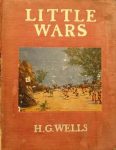
Designed by none other than H.G. Wells, Little Wars pioneered the idea of a tabletop war game. While it wasn’t the first to use miniatures in a war simulation, Wells was the first to bring the idea to the average person’s table as a fun game to play (rather than an actual war simulation used by the military). From Warhammer to Squad Leader, most modern war games can give thanks to Little Wars and H.G. Wells for the inspiration.
2 Players • Ages 12+ • 90 Minutes
2. Monopoly
 I know, Monopoly is really fun to hate on. Compared to almost any other modern board game, it’s terrible. However one cannot deny what a juggernaut this game has been for almost a century. Monopoly is one of most peoples first exposure to board gaming and, like it or not, it’s still a staple on many tabletops even today. While it’s definitely not without its problems, Monopoly’s popularity has paved the way for many other board games.
I know, Monopoly is really fun to hate on. Compared to almost any other modern board game, it’s terrible. However one cannot deny what a juggernaut this game has been for almost a century. Monopoly is one of most peoples first exposure to board gaming and, like it or not, it’s still a staple on many tabletops even today. While it’s definitely not without its problems, Monopoly’s popularity has paved the way for many other board games.
2-8 Players • Ages 8+ • 60-120 Minutes • $20
3. Dungeons and Dragons
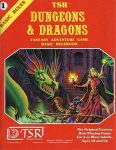 Originally designed by Gary Gygax and Dave Arneson, Dungeons and Dragons is largely recognized as the founder of the modern tabletop roleplaying game (RPG). This RPG was created to take players from simply being historical war gamers into a more imaginative, fantasy world where anything is possible. Dungeons and Dragons is now in its 5th edition, and has been inspiring legions of dungeon masters and offshoot games since its inception in 1974
Originally designed by Gary Gygax and Dave Arneson, Dungeons and Dragons is largely recognized as the founder of the modern tabletop roleplaying game (RPG). This RPG was created to take players from simply being historical war gamers into a more imaginative, fantasy world where anything is possible. Dungeons and Dragons is now in its 5th edition, and has been inspiring legions of dungeon masters and offshoot games since its inception in 1974
2+ Players • Ages 12+ • 3-4 per session • $25
4. The Settlers of Catan
 Design by Klaus Teuber in 1995, Catan is widely recognized as the first german-style board game to achieve massive popularity outside of Europe and helped coin the term “eurogame”. For the longest time, The Settlers of Catan was the goto gateway game when someone wanted to introduce a new player to our hobby. While it’s status as the default gateway game has mostly been usurped by other games, it’s not hard to see the influence it’s had on euro games today. 20 years later, The Settlers of Catan is still making its way to people’s gaming tables.
Design by Klaus Teuber in 1995, Catan is widely recognized as the first german-style board game to achieve massive popularity outside of Europe and helped coin the term “eurogame”. For the longest time, The Settlers of Catan was the goto gateway game when someone wanted to introduce a new player to our hobby. While it’s status as the default gateway game has mostly been usurped by other games, it’s not hard to see the influence it’s had on euro games today. 20 years later, The Settlers of Catan is still making its way to people’s gaming tables.
3-4 Players • Ages 10+ • 60-120 Minutes • $30
5. Magic: The Gathering
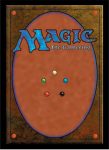 Designed by Richard Garfield in 1993, Magic: The Gathering spawned a whole new genre of games, the collectible card game (CCG). Players would buy one starter deck, and then acquire more cards via randomized boosters. Love it or hate it, Magic remains is still an unstoppable force that is still played by its legions of fans today, despite many challengers gunning for its crown. Today, Magic can sometimes be solely responsibly for keeping a gaming store in business. I played Magic: The Gathering back in the late 90s and, once I left to college, I sold my cards off, thinking the game had run its course. Boy was I wrong.
Designed by Richard Garfield in 1993, Magic: The Gathering spawned a whole new genre of games, the collectible card game (CCG). Players would buy one starter deck, and then acquire more cards via randomized boosters. Love it or hate it, Magic remains is still an unstoppable force that is still played by its legions of fans today, despite many challengers gunning for its crown. Today, Magic can sometimes be solely responsibly for keeping a gaming store in business. I played Magic: The Gathering back in the late 90s and, once I left to college, I sold my cards off, thinking the game had run its course. Boy was I wrong.
2 Players • Ages 12+ • 20 Minutes • $20
6. Call of Cthulhu
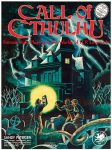 Designed by Sandy Petersen, Call of Cthulhu is now in its 7th edition and still being played today. This pen and paper role playing game drops players into a story as investigators centered around the Lovecraft mythos. For players looking to break out from the fantasy genre, Call of Cthulhu fit the bill perfectly. However what Call of Cthulhu really did was inspire a legion of board games that piggy backed of the popularity of the Cthulhu Mythos. Ironically, before The Call of Cthulhu RPG, most people had never even heard of HP Lovecraft, or his writings. Today, Cthulhu is one of the most widespread themes in gaming, something that Call of Cthulhu helped bring to the forefront.
Designed by Sandy Petersen, Call of Cthulhu is now in its 7th edition and still being played today. This pen and paper role playing game drops players into a story as investigators centered around the Lovecraft mythos. For players looking to break out from the fantasy genre, Call of Cthulhu fit the bill perfectly. However what Call of Cthulhu really did was inspire a legion of board games that piggy backed of the popularity of the Cthulhu Mythos. Ironically, before The Call of Cthulhu RPG, most people had never even heard of HP Lovecraft, or his writings. Today, Cthulhu is one of the most widespread themes in gaming, something that Call of Cthulhu helped bring to the forefront.
2+ Players • Ages 12+ • 3-4 per session • $45
7. Dominion
 Back in 2008, Donald X. Vaccarino created a new genre of board game, the deck building game. Based around the concept of building your deck as the game progresses, this revolutionary concept wasn’t seen in games outside of Magic: The Gathering. And in Magic, all the deck building takes place before the game even started. Dominion really was something we hadn’t seen before. With a dozen expansions released, its influence helped inspire an uncountable number of new deck building games, with countless more hitting our tabletops every year.
Back in 2008, Donald X. Vaccarino created a new genre of board game, the deck building game. Based around the concept of building your deck as the game progresses, this revolutionary concept wasn’t seen in games outside of Magic: The Gathering. And in Magic, all the deck building takes place before the game even started. Dominion really was something we hadn’t seen before. With a dozen expansions released, its influence helped inspire an uncountable number of new deck building games, with countless more hitting our tabletops every year.
2-4 Players • Ages 10+ • 30 Minutes • $30
8. Risk: Legacy
 The board game Risk has been around in various iterations since the 1950s. However in 2011, designer Rob Daviau put his own spin on this decades old game. Rob introduced us the Legacy style game, which had players tearing up cards, writing on the board, and open sealed containers throughout the campaign. While the thought of destroying game components can give the average gamer the chills, there is no denying what a unique game Risk: Legacy was. Legacy style games have been more prevalent in recent years (Seafall, Gloomhaven, Pandemic: Legacy), and they can all give their thanks to Risk: Legacy for paving the way.
The board game Risk has been around in various iterations since the 1950s. However in 2011, designer Rob Daviau put his own spin on this decades old game. Rob introduced us the Legacy style game, which had players tearing up cards, writing on the board, and open sealed containers throughout the campaign. While the thought of destroying game components can give the average gamer the chills, there is no denying what a unique game Risk: Legacy was. Legacy style games have been more prevalent in recent years (Seafall, Gloomhaven, Pandemic: Legacy), and they can all give their thanks to Risk: Legacy for paving the way.
3-5 Players • Ages 10+ • 60 Minutes • $40
9. XCOM: The Board Game
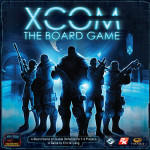 As technology becomes more and more ubiquitous in our lives, it’s only natural that it began to creep into our tabletop games. While not the first game to use technology in it, what XCOM: The Board Game did do was bring us a game that worked fully with an integrated app. The app in XCOM decided what the aliens did, threw curve balls at the players, and even acted as a timer to keep them on their feet. While there was a good amount of push back at the time, today most gamers have embraced integrated apps, with games such as Mansions of Madness and Detective: A Modern Crime Board Game all using an integrated app to enhance the gaming experience.
As technology becomes more and more ubiquitous in our lives, it’s only natural that it began to creep into our tabletop games. While not the first game to use technology in it, what XCOM: The Board Game did do was bring us a game that worked fully with an integrated app. The app in XCOM decided what the aliens did, threw curve balls at the players, and even acted as a timer to keep them on their feet. While there was a good amount of push back at the time, today most gamers have embraced integrated apps, with games such as Mansions of Madness and Detective: A Modern Crime Board Game all using an integrated app to enhance the gaming experience.
1-4 Players • Ages 12+ • 90 Minutes • $50
10. Zombicide
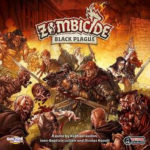 This one might be a bit of a surprise as the game itself wasn’t all that revolutionary (although it was pretty fun). However what Zombicide did do was help launch the Kickstarter revolution. While games had been funding on Kickstarter well before Zombicide, this was one of the very first games to debut at the $100 price point. Not only that, but it also brought us a massive amount of stretch goals that threw piles of extra at the players for no additional cost. It’s hard to believe that there was at time when pledging $100 for a board game, possibly years in advance, was unheard of. I remember seeing the campaign at the time and thinking it was way to pricey for a game. Again, I was proven wrong. Today it’s all too common for a minis game to have $100 pledge levels or even higher! And publishers can thank Zombicide for breaking the ground on that front.
This one might be a bit of a surprise as the game itself wasn’t all that revolutionary (although it was pretty fun). However what Zombicide did do was help launch the Kickstarter revolution. While games had been funding on Kickstarter well before Zombicide, this was one of the very first games to debut at the $100 price point. Not only that, but it also brought us a massive amount of stretch goals that threw piles of extra at the players for no additional cost. It’s hard to believe that there was at time when pledging $100 for a board game, possibly years in advance, was unheard of. I remember seeing the campaign at the time and thinking it was way to pricey for a game. Again, I was proven wrong. Today it’s all too common for a minis game to have $100 pledge levels or even higher! And publishers can thank Zombicide for breaking the ground on that front.
1-6 Players • Ages 10+ • 60-120 Minutes • $50
As we said at the start, this isn’t an all encompassing list, as there are tons of games that have really left their mark on our hobby. What other games have influenced modern board gaming? Let us know in the comments below.





















Axis & Allies belongs on the list.
I would ditch Call of Cthulhu. Call of Cthulhu owes its existence to D & D.
Thus, it is redundant on this list.
I think you completely missed the point as to why Call of Cthulhu is on this list. As I wrote in the entry, It’s not for what it did for RPGs, it’s because it spawned an entire genre of gaming. Take a look at how many games out there either use the Cthulhu Mythos as its main theme, or even pull inspiration from it. There is a MASSIVE amount of Lovecraftian games that can all thank Call of Cthulhu for creating an interest in Lovecraftian horror.
Seeing as Axis & Allies owes it’s existence to Risk and Little Wars, your logic does not hold
I think Pandemic should be on this list. It did not invest cooperative play, but it did make it popular. Suddenly, a lot of people that didn’t enjoy the competitive nature of gaming found they could really get into games. Up until it came out there were very few co-ops, with Knizia’s Lord of the Rings being the most popular yet there weren’t many games in the genre during the five years between those two games.
That’s an interesting point. While this list is definitely only 10 examples and not meant to be the only games out there that changed our niche, one could argue that Arkham Horror, which predated pandemic by 3 years was more of a pioneer in the cooperative genre.
Cosmic Encounter needs to be here. It is the watershed moment in modern board gaming. Cards and board play, assymetry, shaky alliances and expansion packs in 1976 even!
Interesting option. While there is not debate that it’s a great game, I wonder how influential it was in shaping our hobby.
So Zombicide, in other words, put the unending delivery delays of Kickstarter squarely on the map. Got it.
People who complain about Kickstarter delivery dates have a gross misunderstanding both of the manufacturing process and the meaning of the word “estimated”. Creating games overseas is neither quick, nor simple, especially when miniatures are involved. As long as a publisher is updating backers with some regularity on the process, backers just need to learn patience. Would you rather have a game now or done right? Just remember the old quote from Shigeru Miyamoto:
“A delayed game is eventually good, but a rushed game is forever bad.”
I agree that Pandemic led the charge for cooperative play and Axis & Allies proved a board game could both be accessible and have depth. It also showed that people would pay extra for quality content.
Not that I would take any of the others off. Maybe it should be a top 12. 🙂
This list has several errors. First of all Puerto Rico and Power Grid are probably the two games that had the biggest influence on modern board games. And XCOM is basically a ripoff of Space Alert.
🙄
Monopoly did more to dissuade people from playing board games than anything else.
As much fun as it is to rag on monopoly, that’s just not true in the slightest. Monopoly, even after 80 years is still a top 10 selling board game. It’s sold over 250 million copies. People aren’t buying them as collectors items. They are opening them and playing them. It’s still played by lots of people today.
Modern board games are still a very, very small niche.
Modern board games have taken a lot from Monopoly: set collection, trading, negotiation, auctions, economic engine building, and — admit it — the whole board is one big rondell.
I understand your point about Zombiecide being a price point maker for Kickstarter. But Alien Frontiers made Kickstarter/crowdfunding a viable platform for board game creators as the first truly successful board game Kickstarter/crowdfunding that didn’t produce a terrible game and was widely accepted by the board game hobbyist community. No doubt something else would have come along eventually and done the same thing but it is what it is and Alien Frontiers is that game.
Kudos for daring to put Monopoly on the list. It absolutely deserves it. I think all of them are good choices, in fact. The only one I might quibble with would be X-Com, but that’s because I don’t think it was very influential in app integration. I don’t think any singular game was. App integration was just what everyone expected board games to do eventually.
It’s interesting that you think that everyone was expecting board games to get app integration because there is still a very vocal crowd who want zero technology with their board games.
Well, I said it’s what everyone “expected”, not what they wanted. 🙂